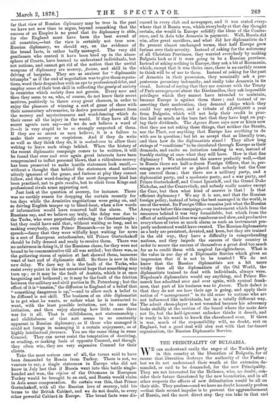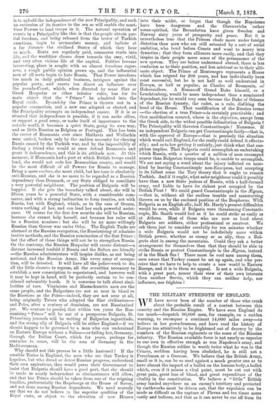THE PRINCIPALITY OF BULGARIA.
WE can understand easily the anger of the Turkish party in this country at the liberation of Bulgaria, for of course that liberation destroys the authority of the Pashas ; but we do not understand their wrath at the extension de- manded, or said to be demanded, for the new Principality. They are not interested for the Hellenes, who, no doubt, con- sider their future threatened by the new boundaries, and in all other respects the effects of new delimitation would be all on their side. They profess—and we have no doubt honestly profess —that their second impulse is to prevent the aggrandisement of Russia, and the most direct step they can take to that end is to uphold the independence of the new Principality, and such an extension of its frontier to the sea as will enable the mari- time Powers to land troops in it. The natural operation of events in a Principality like this is that the people obtain par- tial freedom, and being released from the terror of Turkish exactions, begin to accumulate money, and imitate at a far distance the civilised States of which they hear so much. Rents are regularly paid, commerce starts into life, and the wealthier classes draw towards the easy, vivid, and very often vicious life of the capital. Politics become interesting, place is sought with an almost ferocious eager- ness, a rough public opinion grows up, and the influential men of all sorts begin to hate Russia. That Power interferes too much in daily political business, intrigues against the popular party, and exerts too direct an influence over the pseudo-Court, which, when directed by some Slav or Greek Hospodar or other inferior ruler, has for its main object that the " Prince " be admitted into the Royal circle. By-and-by the Prince is thrown out in a popular commotion, and a new one adopted or elected, and the Principality attempts an independent career. If it is so situated that independence is possible, if it can make allies, or support a good army, or make itself of importance to the outside world, it becomes a quiet State, going its own way, and as little Russian as Belgium or Portugal. This has been the career of Roumania ever since Moldavia and Wallachia were united, broken only by the sudden necessity for obeying Russia caused by the Turkish war, and by the impossibility of finding a friend who would at once defend Roumania and grant it independence, and this is its attitude now. At this moment, if Roumania had a port at which British troops could land, she would not cede her Bessarabian county, and would be the most difficult of all Powers for Russia to manage. Being a mere enclave, she must yield, but her tone is absolutely anti-Russian, and she is no more to be regarded as a Russian dependency than Denmark, or any State obliged to conciliate a very powerful neighbour. The position of Bulgaria will be happier. If she gets the boundary talked about, she will in fifteen years be a powerful State, with a considerable com- merce, and with a strong inclination to form treaties, not with Russia, but with England, which, as in the case of Greece, wants nothing of her, and can lend her such powerful assist- ance. Of course for the first few months she will be Russian, because she cannot help herself, and because her ruler will be a Russian nominee ; but she will be no more willingly Russian than Greece was under Otho. The English Turks are alarmed at the Russian occupation, the Russianising of adminis- trative methods, and the Russian nomination of the first Prince ; but the effect of those things will not be to strengthen Russia. On the contrary, the Russian Hospodar will create distrust—a distrust increased tenfold if Russia and the Sultan are friendly —the Russian administrators will inspire dislike, as not being national, and the Russian Army, like every army of occupa- tion, will be detested. It will have all the police-work to do, all the little e'meutes to repress, all the severities necessary to establish a new conscription to superintend, and however well it may be kept in hand, will be perfectly certain to be con- sidered unbearably harsh. It is nonsense to talk about simi- larities of race. Virginians and Massachusetts men are the same people, and the Bulgarians are not so near in blood to the Russians as the Poles—indeed, they are not near at all, being originally Tatars who adopted the Slav civilisation— and Poles, after a century of dominion, are not Russianised yet. We venture to predict that within ten years the Rus- sianising "Prince" will be out of a prosperous Bulgaria, St. Petersburg journals will be writing of Bulgarian ingratitude, and the strong ally of Bulgaria will be either England—if we should happen to be governed by a man who can understand an Eastern Europe without a Sultan—or failing her, Germany, through the Italian Court, which for years, perhaps for centuries to come, will be the arm of Germany in the Mediterranean.
Why should not this process be a little hastened ? If the sensible Tories in England, the men who see that Turkey is hopeless, but who dread or detest Russian progress, understood their own aspirations, they would press their Government to insist that Bulgaria should have a good port, that she should be made as nearly independent as circumstances will allow, and that her Prince should be taken, from one of the reigning families, preferentially the Hapsburgs or the House of Savoy, and not from among Russian dependents. We need scarcely say that we do not believe in the superior qualities of the Royal caste, or object to the elevation of new , Houses into their midst, or forget that though the Napoleons have been dangerous and the Obrenovichs rather mean-spirited, the Bernadottes have given Sweden and Norway sixty years of prosperity and peace. But it is nevertheless true that the Princes chafe more under foreign dictation than men who are still actuated by a sort of social ambition, who bend before Courts and want to marry into dynasties ; that they form alliances more easily, and that they inspire in their people more sense of the permanence of the new system. They are better understood abroad, there is less confusion as to their position, and less mistrust as to their ulti- mate object. The Prince of Montenegro represents a House which has reigned for 200 years, and has individually been most successful, but he is not half as well understood in Europe, or half as popular, as Charles of Roumania, ne Hohenzollern. A Romanoff Grand Duke himself, or a Leuchtenberg, would be more independent than a nominated dependant, for he would very soon become the Duke of Orleans of the Russian dynasty, the cadet, as a rule, disliking the head of the House. That modification of the Russian terms —the election of a true Prince—is certainly practicable ; and that modification secured, where is the objection, except from the Greek side, to the widest possible delimitation of Bulgaria ? The Principality will threaten Constantinople ? Nonsense. If an independent Bulgaria can get Constantinople fairly—that is, with the approval of Europe—that is precisely the situation which would suit England, for she really could defend it effectu- ally ; and as to her getting it unfairly, just think what that sus- picion implies. That Bulgaria could accomplish an undertaking which Russia, with a quarter of a million of men encamped nearer than Bulgarian troops could be, is unable to accomplish. We are not saying a word about the injury inflicted on man- kind by leaving Constantinople non-European, but accepting in its fullest sense the Tory theory that it ought to remain Turkish. And if it ought, what safer neighbour could it possibly have than a new State jealous of Russia, with a half-formed army, and liable to have its richest port occupied by the British Fleet ? We could guard Constantinople in the ./Egean, —that is, without all the endless trouble and manoeuvring thrown on us by the enclosed position of the Bosphorus. With Bulgaria as an English ally, half Mr. Hardy's present difficulties would be over, while if Bulgaria were threatening Constanti- nople, Mr. Smith would feel as if he could strike as easily as at Athens. Most of those who are now so loud about Bulgaria are soldiers, either professional or amateur. We ask them just to consider carefully for ten minutes whether a wide Bulgaria would not be indefinitely more -within British power, whether as enemy or as ally, than a Bul- garia shut in among the mountains. Could they ask a better arrangement for themselves than that they should be able to strike Russia or protect Constantinople in the Egean, instead of in the Black Sea ? There must be cool men among them, men aware that Turkey cannot be set up again, and who per- ceive that we have to help to create a new world in Eastern Europe, and it is to them we appeal. Is not a wide Bulgaria, with a great port, nearer their view of their own interests than another Servia, which they can neither help, nor influence, nor frighten ?



































 Previous page
Previous page